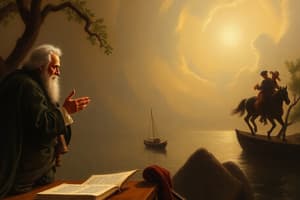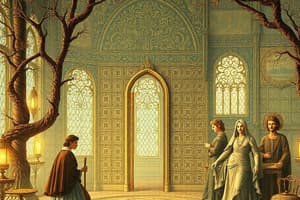Podcast
Questions and Answers
What major Enlightenment concept was proposed by John Locke?
What major Enlightenment concept was proposed by John Locke?
- Divine Right of Kings
- Social contract
- Separation of powers
- Natural rights (correct)
Which thinker is associated with the argument for separating state powers into different branches?
Which thinker is associated with the argument for separating state powers into different branches?
- Jean-Jacques Rousseau
- Baron de Montesquieu (correct)
- John Locke
- Voltaire
What does the concept of 'consent of the governed' imply?
What does the concept of 'consent of the governed' imply?
- Natural rights can be overridden by government decree.
- Citizens should participate in state religion.
- People are obligated to reform the state if their rights are not protected. (correct)
- The state has absolute power over citizens.
Which Enlightenment thinker criticized state religion and advocated for its private practice?
Which Enlightenment thinker criticized state religion and advocated for its private practice?
Rousseau’s controversial stance advocated for what in relation to individual rights?
Rousseau’s controversial stance advocated for what in relation to individual rights?
What influence did the Scientific Revolution have on Enlightenment thinkers?
What influence did the Scientific Revolution have on Enlightenment thinkers?
Which revolutionary movement was influenced by Enlightenment ideas?
Which revolutionary movement was influenced by Enlightenment ideas?
What role did philosophes play in the Enlightenment?
What role did philosophes play in the Enlightenment?
Which of the following concepts was advocated by Enlightenment thinkers related to government structure?
Which of the following concepts was advocated by Enlightenment thinkers related to government structure?
Why did Enlightenment ideals spread rapidly through Europe and the Americas?
Why did Enlightenment ideals spread rapidly through Europe and the Americas?
Flashcards
Natural Rights
Natural Rights
The theory that individuals possess inherent rights to life, liberty, and property that should be protected by the state.
Consent of the Governed
Consent of the Governed
The principle that governments derive their legitimacy from the consent of the governed, meaning people must agree to be ruled.
Constitutionalism
Constitutionalism
The idea that the state's power should be limited by a set of laws, often written and agreed upon by citizens.
Separation of Powers
Separation of Powers
Signup and view all the flashcards
Legislative Branch
Legislative Branch
Signup and view all the flashcards
Executive Branch
Executive Branch
Signup and view all the flashcards
Judicial Branch
Judicial Branch
Signup and view all the flashcards
The Enlightenment
The Enlightenment
Signup and view all the flashcards
Philosophes
Philosophes
Signup and view all the flashcards
General Will
General Will
Signup and view all the flashcards
Study Notes
The European Enlightenment (1750-1900)
- Enlightenment thinkers challenged traditional religious and political authority, particularly the Divine Right of Kings and the hereditary class system.
- The Scientific Revolution emphasized reason and rationality, influencing Enlightenment thought.
- John Locke championed natural rights (life, liberty, property) and the idea of the consent of the governed.
- The state's role is to protect these rights or face reform.
- Constitutionalism advocates limiting state power through agreements by citizens.
- Baron de Montesquieu proposed the separation of powers doctrine.
- It divides governmental powers into independent legislative, executive, and judicial branches to prevent tyranny.
- Enlightenment philosophes (e.g., Voltaire, Rousseau) questioned state control over religion.
- Voltaire argued against state religion as a source of intolerance.
- Rousseau believed in a "general will" of the people as ultimate authority; his views diverged from individual rights-based approaches.
- Enlightenment ideas spread across Europe and the Americas inspiring revolutionary movements.
- American Revolution (1776-1783) led to a constitutional republic with protections for individual rights.
- French Revolution (1789-1799) overthrew monarchy and aristocracy, giving power to the people.
- Latin American Revolutions (19th century) resulted in independence and nation-building.
Studying That Suits You
Use AI to generate personalized quizzes and flashcards to suit your learning preferences.




